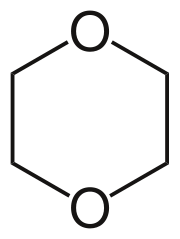Dioxane Anhydous

Product Description
Dioxane, also known as 1,4-dioxane, is a heterocyclic organic compound with various industrial and laboratory applications.
Product:
Dioxane Anhydous
CAS:
123-91-1
Synonym:
Diethylene oxide; 1,4-Dioxane; Diethylene ether
Structure:

Typical Characteristics
Appearance
Colorless liquid
Boiling point
100-102 °C
Density
1.034 g/cm3
Flash Point
18 °C
Melting point
10-12 °C
Molecular Weight
88.11
Odor
Mild, ether-like odor
Purity
99.8%
Refractive index
1.422
Uses, Applications & Markets
Key applications
get a quote
We Offer Dioxane Anhydous
in various grades
A few of the grades available are listed below:



Dioxane Anhydous used in many
industry applications
Dioxane, also known as 1,4-dioxane, is a heterocyclic organic compound with various industrial and laboratory applications. Here are some of its uses:
- Solvent: Dioxane is commonly used as a polar aprotic solvent in organic synthesis and industrial processes. It has a high solvency power for a wide range of organic and inorganic compounds, making it suitable for use in reactions, extractions, and purifications.
- Chemical Intermediate: It serves as an intermediate in the synthesis of various organic compounds and fine chemicals. Dioxane may undergo chemical transformations such as ring-opening reactions, substitution reactions, and condensation reactions to produce desired products.
- Stabilizer: Dioxane is used as a stabilizer or solvent in formulations of certain chemicals, polymers, and products. It can help improve stability, solubility, and shelf life by preventing degradation, crystallization, or precipitation of active ingredients or additives.
- Extraction Medium: It is used as an extraction medium for the isolation and purification of organic compounds from natural sources or reaction mixtures. Dioxane may be used in liquid-liquid extractions, solid-phase extractions, and other extraction techniques to recover target compounds.
- Reagent: Dioxane may be employed as a reagent or reaction medium in laboratory research and chemical synthesis. It can serve as a solvent, diluent, or reaction medium for various organic reactions, including Grignard reactions, organometallic reactions, and nucleophilic substitutions.
- Plasticizer: It is used as a plasticizer in the production of plastics, polymers, and resins. Dioxane can improve flexibility, durability, and processing characteristics of plastic materials, making them more suitable for applications such as films, coatings, and molded products.
- Adhesive Formulation: Dioxane may be included in adhesive formulations as a solvent or co-solvent to improve viscosity, adhesion, and drying characteristics. It can be used in the production of adhesives, sealants, coatings, and laminates for various industrial and consumer applications.
- Textile Processing: It is used in the textile industry for dyeing and finishing processes. Dioxane may be employed as a solvent, dye carrier, or leveling agent to enhance dye uptake, uniformity, and fastness of textile dyes on fibers and fabrics.
- Paint and Coating Industry: Dioxane may find applications in the paint and coating industry as a solvent, dispersant, or coalescing agent. It can help dissolve resins, pigments, and additives, improve paint flow, leveling, and film formation, and enhance coating properties.
- Personal Care Products: Dioxane may be used in the formulation of personal care products such as cosmetics, toiletries, and pharmaceuticals. It can serve as a solvent, carrier, or stabilizer in creams, lotions, shampoos, and topical medications.